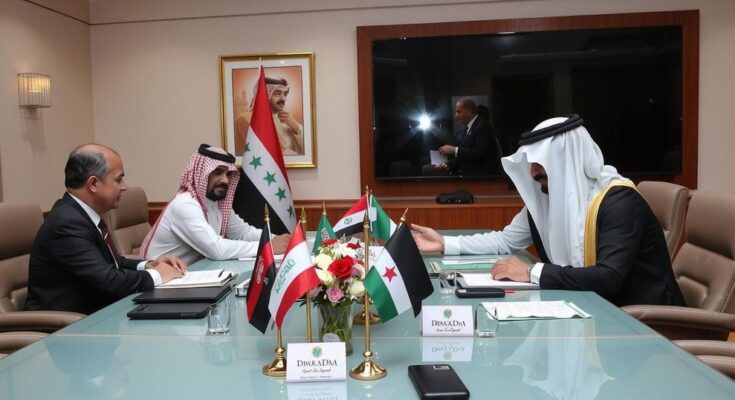Syrian Foreign Minister Asaad Al-Shaibani met with Qatar’s leadership to discuss Syria’s rebuilding plans and the adverse impact of economic sanctions. He proposed a roadmap aimed at empowering citizens and forming an inclusive government, emphasizing the need for U.S. sanctions to be lifted. Qatar’s role is highlighted as strategic in both diplomatic and economic contexts, particularly concerning a potential gas pipeline connecting to Turkey.
On January 5, Syrian Foreign Minister Asaad Al-Shaibani engaged in significant discussions in Doha with Qatar’s Prime Minister and Foreign Minister, Sheikh Mohammed bin Abdulrahman bin Jassim Al Thani, regarding Syria’s rebuilding efforts and the impact of ongoing economic sanctions. Following these extensive talks, Al-Shaibani characterized their meeting as being deep and strategic, emphasizing the importance of Qatar’s past and present support for Syria.
Al-Shaibani introduced what he referred to as a roadmap for Syria’s reconstruction, which aims to empower citizens’ civil rights and establish an inclusive government. He categorically pointed out that economic sanctions, which he described as detrimental to the Syrian populace, constitute a barrier to rapid economic recovery. The minister implored the United States to reconsider these sanctions to facilitate the development of a “new Syria.”
He articulated that this envisioned Syria would cultivate positive relations with neighboring countries based on peace and cooperation, distancing itself from the previous regime’s patterns. Furthermore, Al-Shaibani articulated the necessity for honesty and collaboration with regional nations, aspiring to create a “new Syria” characterized by justice and equality.
Qatar’s diplomatic engagement with the Syrian administration has been notably proactive, having held its first meeting with the new leadership on December 23. Recently, Qatar dispatched a high-level delegation to Damascus, enhancing its diplomatic ties following the recent changes in Syria’s leadership. Moreover, Qatar’s relations with Turkey, a major influencer in the region, further bolster its position in connecting with Syria.
This diplomatic outreach is not merely political; it carries economic implications, particularly concerning the potential establishment of a gas pipeline connecting Qatar through Syria to Turkey. This project could reshape regional energy dynamics, potentially supplying European markets with gas alternatives, distancing them from reliance on Russian supplies. Arab nations are currently observing these developments with caution, particularly given the complexities following the takeover by Islamist groups in Syria.
The importance of this dialogue between Qatar and Syria is framed within the wider context of Syria’s ongoing reconstruction after years of conflict, which devastated its economy and infrastructure. Following the recent power shifts in Syria, notably led by forces such as Hayat Tahrir al-Sham (HTS), Qatar emerges as a pivotal regional player. The implications of Qatar’s involvement extend beyond aid and political support to include significant economic interests, particularly in energy, amid a backdrop of fluctuating alliances in the Middle East. As Arab states cautiously navigate their relationships with the Assad regime, Qatar’s proactive stance signifies a robust strategy to reshape regional dynamics.
In conclusion, the ongoing discussions between Syria and Qatar reflect a crucial initiative aimed at rebuilding Syria amidst significant challenges such as economic sanctions. Minister Al-Shaibani’s appeal for the lifting of sanctions underscores the urgency of fostering economic recovery and strengthening Syrian identity through inclusive governance. The potential for a new energy infrastructure linking Qatar, Syria, and Turkey further strengthens Qatar’s strategic positioning and underscores the complexities of Middle Eastern geopolitics.
Original Source: www.intellinews.com




